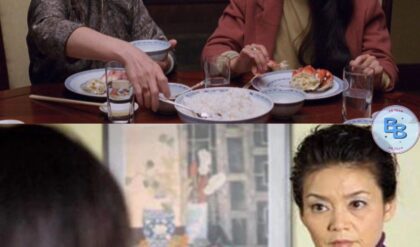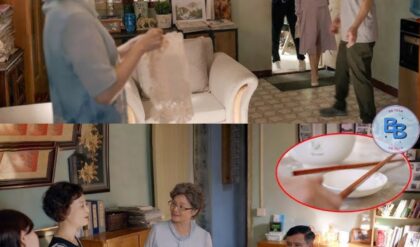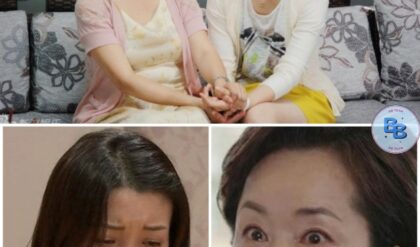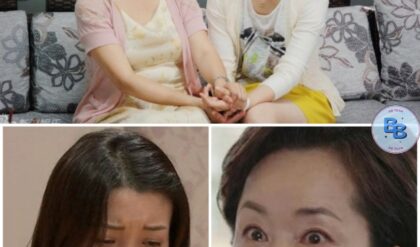In one of the latest episodes of Vice Ganda’s show, the comedian was thoroughly entertained by the story shared by a young girl, lovingly called “Kulot”, about her father. The child’s innocent and candid recount of her family dynamics left everyone in stitches, as she humorously narrated her experiences with her dad. However, as Vice laughed and the audience reacted to the child’s adorable and relatable story, a deeper, more poignant truth lingered underneath the surface.

Kulot’s story was lighthearted and filled with humor, but Vice Ganda couldn’t help but reflect on the real-life implications of growing up in a household where parents frequently argue in front of their children.
The Power of Innocence in a Child’s Perspective
Kulot’s playful account about her dad had everyone in the studio laughing, but the humor wasn’t just in her delivery. It was in the truths that lay beneath the surface of her innocent words. As a child, she spoke candidly about her father, his quirks, and their relationship. What seemed like a funny moment soon became a realization for both Vice Ganda and the audience on the potential long-term impact of parental conflict.
It’s a reality that many children experience—hearing parents argue, not understanding the full weight of it but still feeling the tension. The effects of these arguments can linger far beyond childhood, leaving psychological marks that often go unnoticed.
“Nakakatawa, ‘di ba? Pero alam mo, pag naisip mong lumalaki ang bata, iniisip ko na lang, baka kung anong epekto ang meron ‘yan sa kanya paglaki,” Vice Ganda commented after hearing Kulot’s story, highlighting how arguments at home can shape a child’s emotional growth.
The Long-Term Effects of Parental Conflict
While Vice was entertained by Kulot’s innocent humor, there was a noticeable moment of pause as he pointed out how it’s not just about the funny anecdotes children share. It’s about the subtle, yet powerful, effects of conflict on their emotional well-being. Children are highly impressionable, and what might seem like a fleeting argument between parents can actually have deep, lasting consequences.
Research has shown that when children witness frequent conflicts or hostile interactions between their parents, it can lead to:
-
Emotional Strain – Kids may struggle to understand or process what’s happening between their parents. This confusion can lead to feelings of anxiety, guilt, or helplessness.
Attachment Issues – Growing up in an environment of constant conflict can affect how children form relationships later in life, often making them fearful of conflict or distrustful of others.
Behavioral Changes – Children who are exposed to high levels of conflict may develop behavioral problems, like aggression, withdrawal, or difficulty concentrating in school.
Low Self-Esteem – When parents argue frequently, children may internalize the conflict, leading to self-blame or feelings of worthlessness.

Vice’s reflective moment highlighted how something as innocent as Kulot’s playful banter could actually be a subtle indication of the deeper emotional impact that witnessing conflict can have. The fact that Kulot seemed unaffected by her father’s behavior might be humorous at first glance, but as Vice pointed out, it’s the long-term psychological scars that matter.
The Importance of Resolving Conflicts in a Healthy Way
Vice’s comments serve as a reminder to all parents about the importance of managing their conflicts in a way that doesn’t harm their children. Arguments are inevitable in any relationship, but how parents handle their disagreements is crucial.
Private Disagreements: It’s important for parents to avoid arguing in front of their children. Children don’t need to be exposed to every detail of adult problems. Parents can try to keep discussions or disagreements private, away from the emotional influence of their children.
Modeling Healthy Conflict Resolution: Parents should model healthy communication and problem-solving skills. It’s important to show children how conflicts can be resolved calmly and respectfully, teaching them that disagreements don’t have to result in emotional harm or resentment.
Providing Emotional Support: After an argument, it’s essential for parents to check in with their children. Reassuring them that they are not responsible for the conflict and giving them space to express their feelings can help mitigate the negative emotional impact.
The Takeaway: What Vice Wants to Teach the Parents
While Vice Ganda found humor in the child’s innocent retelling of her father’s behavior, he also wanted to remind parents of a valuable lesson: the emotional health of children should always come first. In Vice’s view, parents need to be conscious of their actions and how their behavior affects their kids, whether directly or indirectly. He emphasized that while it’s normal to argue, the key is ensuring that the child feels secure and loved, despite the inevitable ups and downs of adult relationships.
“Nakakatawa nga, pero pag naisip mong lumaki siya at dalhin niya lahat ng iyon, medyo nakaka-guilty ‘di ba?” Vice reflected, recognizing that parents need to be aware of the long-term consequences their actions can have on their children’s emotional health.
A Surprising but Important Realization
Though Vice started off entertained by the child’s funny story, the underlying message he conveyed was serious and heartwarming. It’s not just about the humor of the moment, but the greater responsibility parents have in raising emotionally healthy children.
It’s a gentle reminder to all parents: How we behave in front of our children shapes who they become. Whether it’s a small argument or a big disagreement, the way we handle these situations—especially in front of our kids—can leave a lasting impact on them as they grow older.
In the end, Vice’s entertainment turned into a deep reflection that resonates with everyone, reminding us to think about the long-term effects of our actions on the little ones who look up to us.


 Ex ni Kyline Alcantara na si Kobe, BINISTO ang lahat sa publiko—Lahat ng Baho Isiniwalat
Ex ni Kyline Alcantara na si Kobe, BINISTO ang lahat sa publiko—Lahat ng Baho Isiniwalat


